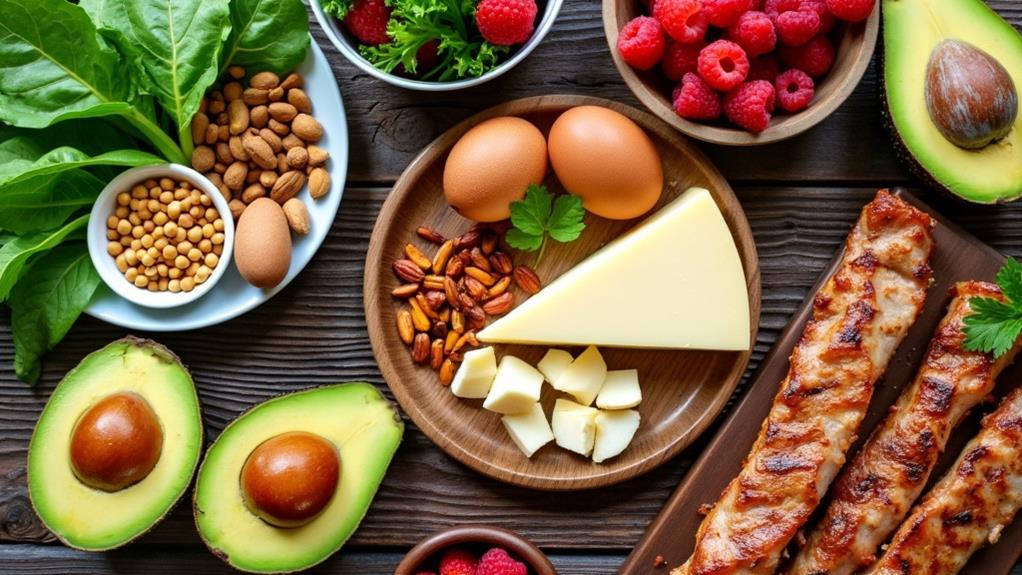
The Lazy Keto Diet focuses on reducing daily carbohydrate intake to 20-50 grams, promoting ketosis without requiring careful tracking of fats and proteins. This flexibility allows for easier adherence while emphasizing high-quality proteins, healthy fats, and non-starchy vegetables. It's beneficial for weight loss, managing blood sugar levels, and may support metabolic health, particularly for individuals with type 2 diabetes. However, potential drawbacks include nutrient deficiencies and sustainability challenges. Proper meal planning and mindful food choices are essential to maximize the diet's benefits. Explore how this simplified approach can fit into your lifestyle and health goals.
Key Takeaways
- Reduces daily carbohydrate intake to 20-50 grams to induce ketosis.
- Simplifies the keto diet by not requiring tracking of protein and fat intake.
- Promotes using fat for energy, reducing appetite and cravings.
- Encourages consumption of whole, nutrient-dense foods while avoiding processed items.
- Supports weight loss and improved blood sugar control, particularly beneficial for type 2 diabetes.
Overview of Lazy Keto
What sets the lazy keto diet apart from its traditional counterpart? The lazy keto diet simplifies the ketogenic approach by focusing primarily on reducing daily carbohydrate intake to 20-50 grams, translating to less than 10% of daily caloric intake.
Unlike traditional keto, which requires meticulous tracking of protein and fat consumption, lazy keto emphasizes ease and dietary flexibility, making it more accessible for individuals who seek substantial dietary changes without stringent monitoring. This diet also helps in reducing ghrelin levels, which can promote natural appetite reduction and enhance feelings of fullness.
The central premise of lazy keto basics is to induce ketosis, a metabolic state where the body uses fat for energy instead of carbohydrates. While precise macronutrient tracking is not mandated, the diet encourages the consumption of high-quality proteins, healthy fats, and non-starchy vegetables.
This not only promotes weight loss but also aids in improved blood sugar control, offering particular benefits to individuals with type 2 diabetes or metabolic syndrome.
The lazy keto diet's relaxed approach reduces the psychological burden often associated with rigorous dietary plans, thereby improving adherence rates. By avoiding processed foods and high-sugar items, it also supports overall health and nutrient balance, maintaining a sustainable path to better health outcomes.
How Lazy Keto Works
Understanding how the lazy keto diet functions begins with recognizing the fundamental shift it creates in the body's energy utilization. By greatly reducing carbohydrate intake to 20-50 grams per day, the diet prompts the body to pivot from relying on glucose to utilizing fat as its primary energy source. This shift aims to induce a state of ketosis, where the liver converts fatty acids into ketones, providing an alternative energy source for the brain and muscles.
Unlike the traditional ketogenic diet, lazy keto simplifies the process by not requiring meticulous tracking of protein and fat intake. This flexible approach focuses primarily on maintaining a low carbohydrate threshold to support the desired macronutrient balance. Despite the relaxed guidelines, the diet can still lead to appetite suppression and reduced cravings due to lower insulin levels, which may facilitate weight loss and improved blood sugar control. The lazy keto diet shares some benefits with other low-carb diets, such as improved satiety and mental clarity.
However, achieving and maintaining ketosis is less certain without rigorous monitoring of macronutrients. Excessive protein intake, in particular, can impede ketosis since the body can convert excess protein into glucose. Consequently, individuals on lazy keto are encouraged to prioritize whole, nutrient-dense foods and avoid high-carb and processed items to support overall health and prevent deficiencies.
Health Benefits
The Lazy Keto diet offers several health benefits, including effective weight loss through reduced carbohydrate intake, which promotes fat burning by lowering insulin levels.
Additionally, it aids in blood sugar control, particularly for individuals with type 2 diabetes, by stabilizing blood glucose and reducing insulin resistance.
In addition, adherence to the ketogenic diet supports steady blood sugar levels and improved metabolic health, contributing to a reduction in HbA1c levels.
Furthermore, the diet can help reduce appetite, making it easier to adhere to healthier eating patterns and achieve sustained weight management.
Weight Loss Effects
Often lauded for its simplicity, the Lazy Keto diet greatly reduces carbohydrate intake to between 20-50 grams per day, which can lead to various weight loss effects and health benefits. Central to its effectiveness is the induction of a caloric deficit and the process of fat adaptation. By considerably lowering carb consumption, the body shifts its primary energy source from glucose to stored fat, promoting increased fat utilization.
This metabolic change not only aids in weight loss but also targets visceral fat, which research indicates can be reduced up to three times more effectively than with low-fat diets.
The simplicity of the Lazy Keto approach, which does not necessitate meticulous tracking of calories or other macronutrients aside from carbs, enhances adherence. This natural caloric deficit supports steady weight loss. Additionally, many individuals report reduced hunger and cravings, likely due to the appetite-suppressing effects of ketosis.
This eases the challenge of maintaining a calorie-restricted diet and facilitates more manageable weight management.
While Lazy Keto may not induce ketosis as rigorously as stricter ketogenic diets, it still offers considerable weight loss benefits by replacing high-carb foods with healthier, low-carb alternatives, promoting overall nutritional quality.
Blood Sugar Control
Maintaining stable blood sugar levels is a critical aspect of metabolic health, and the Lazy Keto diet's restriction of carbohydrates to 20-50 grams daily offers considerable advantages in this regard. By greatly reducing carbohydrate intake, the Lazy Keto diet enhances insulin sensitivity and minimizes blood sugar fluctuations, which is particularly beneficial for individuals with type 2 diabetes.
Research indicates that low-carb diets, such as the Lazy Keto, can lead to more stable blood sugar levels throughout the day by promoting fat as the primary energy source. This dietary approach can also aid in weight loss, which is closely associated with improved blood sugar control and reduced fat storage, further supporting metabolic health. In addition, adopting a Lazy Keto lifestyle may decrease the need for medications aimed at managing blood sugar, as consistent low-carb intake has been shown to improve glycemic control over time.
| Benefit | Impact |
|---|---|
| Lower Blood Sugar Levels | Reduces the risk of hyperglycemia and hypoglycemia |
| Improved Insulin Sensitivity | Enhances the body's ability to manage blood glucose effectively |
| Decreased Blood Sugar Fluctuations | Leads to more stable energy levels throughout the day |
| Potential Medication Reduction | May lessen the reliance on blood sugar management medications |
Appetite Reduction
By leveraging the principles of carbohydrate restriction, the Lazy Keto diet effectively aids in appetite reduction, resulting in numerous health benefits. One primary mechanism is the lowering of insulin levels, which can diminish hunger signals and naturally lead to spontaneous calorie reduction. This physiological shift allows individuals to feel less compelled to consume excess calories, thereby supporting weight loss efforts.
Studies have consistently shown that low-carb diets, such as Lazy Keto, are more effective at suppressing appetite compared to low-fat diets. This is largely attributed to the body's increased production of ketones when carbohydrate intake is limited. Ketones have been linked to decreased hunger and improved satiety, making it easier for individuals to adhere to their dietary goals without feeling deprived.
Additionally, the high-fat content characteristic of the Lazy Keto diet enhances feelings of fullness, as fats take longer to digest compared to carbohydrates. This extended digestion time helps in maintaining a sense of satiety over longer periods, thereby further aiding in calorie reduction.
Moreover, adopting the Lazy Keto diet encourages a more mindful approach to eating. Reduced cravings lead individuals to become more conscious of their food choices and portion sizes, ultimately fostering healthier eating habits.
Potential Drawbacks
While the lazy keto diet offers simplicity, it presents potential drawbacks such as nutrient deficiencies due to a limited variety of whole foods, which may lead to inadequate intake of essential vitamins and minerals.
In particular, hidden carbs in processed foods can disrupt ketosis and contribute to nutrient imbalances.
Additionally, the lack of strict macronutrient tracking can pose sustainability challenges, as it might encourage unhealthy food choices and overeating.
These factors could hinder overall health goals and long-term adherence to the diet.
Nutrient Deficiency Risks
The lazy keto diet, with its emphasis on reducing carbohydrate intake without stringent tracking of macronutrients, can inadvertently lead to various nutrient deficiencies. This approach often leads to the exclusion of nutrient-dense foods, heightening the risk of inadequate intake of essential vitamins and minerals.
Key nutrient sources such as fruits, whole grains, and starchy vegetables are often limited, which can result in deficiencies in:
- Fiber: Essential for digestive health and preventing constipation.
- Magnesium and Potassium: Necessary for muscle function and heart health.
- Vitamins B, C, and E: Important for energy production, immune function, and antioxidant protection.
Reliance on processed low-carb foods exacerbates the issue, as these products typically lack essential nutrients.
Studies indicate that low-carb diets without proper planning can lead to deficiencies in calcium and iron, crucial for bone health and oxygen transport, respectively. Deficiency symptoms may include fatigue, weakened immune function, and poor bone health, underscoring the significance of balanced nutrient sources.
Clients considering the lazy keto diet should prioritize a varied intake of whole foods and consider supplementation to mitigate the risk of nutrient deficiencies.
Proper planning and informed food choices are important to maintaining overall health while following this diet.
Sustainability Challenges**
Addressing the risk of nutrient deficiencies is just one facet of the lazy keto diet's broader challenges. The less restrictive nature of lazy keto often results in inconsistent tracking of carbohydrate intake, leading individuals to exceed recommended limits unknowingly. This lack of precision can undermine diet adherence and necessitate considerable lifestyle modifications to maintain effectiveness.
The simplicity of the lazy keto diet may further encourage the consumption of unhealthy, low-carb processed foods. These food choices often lack essential vitamins and minerals, raising the risk of nutritional deficiencies. Consequently, the overall dietary quality may suffer, making long-term adherence challenging.
| Challenge | Impact |
|---|---|
| Inconsistent Carb Tracking | Exceed recommended carb limits, undermining diet adherence |
| Nutrient Deficiencies | Reduced intake of essential vitamins and minerals |
| Unhealthy Processed Foods | Poor dietary quality, hindered long-term adherence |
| Fluctuating Energy Levels | Affects motivation and commitment to the diet |
Research indicates that the long-term sustainability of the lazy keto diet is questionable. Participants often struggle to maintain a balanced diet while avoiding nutrient-poor options, heightening potential health risks. Without strict adherence to macronutrient ratios, individuals may experience fluctuating energy levels, hunger, and inconsistent weight loss results. This variability can markedly impact motivation and commitment, posing a substantial challenge to sustained lifestyle modifications.
Recommended Foods

A well-structured lazy keto diet emphasizes the inclusion of specific high-quality foods that align with its low-carb, high-fat principles. Central to this approach are high quality meats such as beef, pork, and poultry. These meats are crucial for providing essential proteins and healthy fats while maintaining a low carbohydrate intake.
Additionally, seafood options like salmon and mackerel are highly recommended for their rich omega-3 fatty acids and substantial protein content, guaranteeing the diet remains nutritionally balanced without excess carbs. Shellfish like shrimp and crabs are also beneficial due to their zero-carb content.
Non-starchy vegetables, including leafy greens, broccoli, and bell peppers, are ideal for this diet. They are low in carbohydrates and high in fiber and essential nutrients, supporting overall health while adhering to the diet's carb restrictions. Full-fat dairy products such as cheese, butter, and heavy cream are also encouraged, offering necessary fats that enhance flavor and satiety.
- High quality meats: Beef, pork, poultry
- Low carb fruits: Berries, such as strawberries and blueberries
- Non-starchy vegetables: Leafy greens, broccoli, bell peppers
Incorporating these foods guarantees that the lazy keto diet remains both effective and satisfying, providing essential nutrients while adhering to its core principles.
Foods to Avoid
Steering through the pitfalls of the lazy keto diet requires a clear understanding of foods to avoid to maintain its effectiveness. Central to this approach is the strict limitation of high carb foods.
Bread, pasta, rice, and sugary snacks can swiftly exceed the daily carb limit of 20-50 grams, making it difficult to maintain ketosis. Therefore, these items should be carefully monitored and largely excluded from the diet. Additionally, it's important to avoid refined carbohydrates like white bread and pasta, as they convert swiftly to glucose, disrupting ketosis.
Starchy vegetables, such as potatoes, sweet potatoes, corn, and peas, are particularly high in carbohydrates and should be avoided as well. Their consumption can interfere with reaching and sustaining ketosis, which is essential for the diet's success.
High-sugar fruits, including bananas, apples, oranges, peaches, and melons, also pose a challenge. These fruits contain substantial natural sugars, which can disrupt carb restrictions if not consumed in strict moderation.
Processed snacks and fast foods are another category to steer clear of. These items often harbor hidden sugars and unhealthy carbohydrates that can derail dietary objectives.
Meal Planning Tips

Effective meal planning is fundamental to succeeding with the lazy keto diet, as it guarantees adherence to the low-carb requirements essential for maintaining ketosis. By focusing on low-carb staples such as meats, eggs, and non-starchy vegetables, one can make certain that total carbohydrate intake stays within the 20-50 grams per day range.
To maintain balance and satisfaction, incorporating healthy fats such as avocados, olive oil, and nuts is vital. These fats not only enhance flavor but also promote satiety, making it easier to stick to the diet. Remember to aim for a daily macronutrient breakdown that maintains 70-80% fats, 15-25% proteins, and 5-10% carbs to stay on track with your keto goals.
A key aspect of meal prep for lazy keto is preparing simple recipes in advance. Dishes like casseroles or salads can be made ahead of time to avoid the temptation of high-carb convenience foods during busy periods.
Utilizing ingredient swaps, such as using cauliflower instead of rice or zucchini noodles instead of pasta, can also help in keeping meals low-carb and interesting.
- Plan meals around low-carb staples like meats, eggs, and non-starchy vegetables.
- Incorporate healthy fats such as avocados, olive oil, and nuts to enhance flavor and satiety.
- Prepare simple recipes in advance to avoid high-carb temptations during busy days.
Additionally, food tracking apps can assist in monitoring carbohydrate intake, making certain adherence without the need to track other macronutrients, consequently aligning with lazy keto principles.
Who Should Try Lazy Keto
While meticulous meal planning can greatly enhance adherence to the lazy keto diet, understanding who might benefit most from this approach is equally important.
Ideal candidates for lazy keto are individuals seeking a less restrictive dietary regimen that permits them to limit carbohydrate intake without the necessity of tracking fats and proteins meticulously. This flexibility can make the diet more sustainable for those who have previously struggled with the stringent requirements of traditional ketogenic diets.
Busy individuals or families who enjoy dining out may find lazy keto particularly compatible with their lifestyle. The simplified food choices not only make meal planning more manageable but also facilitate long-term adherence, promoting weight loss and health improvements.
Additionally, lazy keto is especially beneficial for people with conditions such as obesity, metabolic syndrome, or type 2 diabetes, as reducing carbohydrate intake can greatly aid in managing these health issues. The ketogenic diet's role in improving blood sugar and triglyceride levels further supports its use for these conditions.
Furthermore, those looking for a straightforward method to achieve a calorie deficit and improve overall health may find lazy keto a practical and sustainable dietary option.
Frequently Asked Questions
What Foods Are on a Lazy Keto Diet?
The Lazy Keto diet includes high-quality proteins, healthy fats, and low-carb vegetables. Lazy keto snacks and meal prep often feature avocados, nuts, leafy greens, and low-sugar fruits, while avoiding grains, starchy vegetables, and high-sugar fruits.
Why Am I Not Losing Weight on Lazy Keto?
Several factors might be hindering weight loss on lazy keto, including mismanaging caloric intake, keto misconceptions about hidden carbs and protein intake, and potential nutritional deficiencies. Addressing these areas can help optimize your weight loss efforts.
Can I Still Lose Weight on Dirty Keto?
While dirty keto benefits include initial weight loss through calorie restriction, dirty keto risks involve nutrient deficiencies and potential long-term health issues. Sustainable weight loss and overall health are more likely with nutrient-dense food choices.
What Is the Difference Between Classic Keto and Lazy Keto?
The primary difference between classic keto and lazy keto is the approach to macronutrient tracking. Classic keto requires meticulous monitoring of fats, proteins, and carbohydrates, while lazy keto focuses solely on limiting carbohydrate intake without tracking other macronutrients.
Conclusion
To summarize, the lazy keto diet simplifies traditional ketogenic principles by focusing primarily on carbohydrate restriction without meticulous tracking of other macronutrients. This approach can offer health benefits such as weight loss and improved metabolic markers, though it may also present potential drawbacks, including nutritional deficiencies. Adherence to recommended and avoided foods, along with strategic meal planning, is essential for effectiveness. The lazy keto diet may be suitable for individuals seeking a less rigorous introduction to low-carb eating.










No Comments